A Conversation With Tess Gerritsen
by Claire E. White
Bestselling novelist Tess Gerritsen took an unusual route to a writing career. A
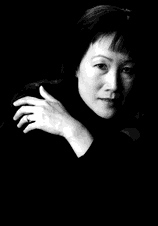
|
While on maternity leave, she began to write fiction. On a whim, she submitted a literary short story to Honolulu Magazine's statewide fiction contest -- and won first place. In 1987, Tess's first novel was published. Call After Midnight, a romantic thriller, was soon followed by eight more romantic suspense novels. She also wrote a screenplay, "Adrift," which aired as a 1993 CBS Movie of the Week starring Kate Jackson.
It was a chance dinner conversation that inspired Tess to write her first medical thriller. The man sitting beside her at the restaurant was an ex-cop who ran a security service protecting American businessmen in Russia. On his last trip abroad, Moscow cops had told him that Russian orphans were vanishing from the streets. They believed the children were being kidnapped by the Russian mafia and shipped abroad as organ donors. The story so horrified Tess, she immediately called her brother-in-law, a reporter for Newsweek, suggesting he investigate. Newsweek, was unable to track down any proof. Weeks later, Tess was still unable to forget those missing Russian orphans. They became the inspiration for the plot of her first medical thriller, Harvest. Harvest was released in hardcover in 1996, and marked Tess's debut on the New York Times bestseller list. Film rights were sold to Paramount/Dreamworks, and the book was translated into twenty foreign languages.
Since then, Tess has written the medical thrillers Life Support (1997), Bloodstream (1998), Gravity (1999) and The Surgeon, which was recently released by Ballantine. Her books are known for their heart-pounding suspense, complex plots, chilling details and memorable characters. The Surgeon is a grisly and absolutely chilling tale of a brave woman doctor who is hunted by a serial killer who operates on his female victims -- while they are still alive. Publisher's Weekly says of The Surgeon, "Thoroughly satisfying... Gliding as smoothly as a scalpel in a confident surgeon's hand, this tale proves that Gerritsen has morphed into a dependable suspense novelist whose growing popularity is keeping pace with her ever-finer writing skills." In a starred review, Kirkus calls The Surgeon a "Top-grade thriller." And even Stephen King counts himself a fan, saying, "She is better than Palmer, better than Cook -- yes, even better than Crichton."
Now retired from medicine, Tess writes full time. She and her family live in Maine. When she's not writing, you might find her spending time with her family, attending to her garden or playing the fiddle. Tess spoke to us about her move from internist to bestselling author, how she creates her characters, and what it was like to inhabit the mind of a serial killer for her latest book.
What authors and/or genres did you most enjoy reading when you were growing up?
Like most female mystery authors I know, I grew up
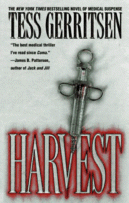
|
What originally drew you to the idea of being a doctor?
I've always been interested in science -- in particular, biology. As a young girl, I used to explore the large canyon near my house in San Diego and would come home with buckets full of lizards. My favorite place to visit was the reptile house at the San Diego Zoo. As I grew up, it seemed only natural for my interest in biology to evolve into pre-med studies in college.
I understand that you started writing professionally while on maternity leave with your first child. What prompted you to enter that first short story contest? How did you feel when you won?
My parents and teachers had always told me I was a good
| "Over the years, I've learned to persist through thick and thin, even when the book is not going well. Only after you've written 'the end' can you truly evaluate whether you've been writing drivel or a masterpiece." |
What inspired you to write your first romance?
During my medical training, I became hooked on reading romance novels. I think they served as literary "comfort food" for me, just the genre I needed during a stressful time in my life. When I finally had the chance to write my first book, it was only natural that I write the very genre I'd been reading so much of.
What was the greatest challenge in writing that first book?
Maintaining the drive to finish it. It's a terrible temptation to give up on a book and start something new. Over the years, I've learned to persist through thick and thin, even when the book is not going well. Only after you've written "the end" can you truly evaluate whether you've been writing drivel or a masterpiece.
How did being a doctor prepare you for being an author?
Medical training was a window into the most personal aspects of peoples' lives. I've seen the most heartbreaking tragedies, and watched families at their very best -- and worst. I think it's the insight into human nature that makes medicine such intense preparation for any writing.
After writing nine romances, you turned to thrillers, with the publication of Harvest in 1996. What prompted you to switch genres?
I wrote Harvest simply because the plot dropped into my lap. I had dinner with a former policeman who'd been traveling in Russia, and he told me that orphans were vanishing from the streets of Moscow. The Russian police believed the children were being sent to other countries as organ donors. That so horrified me that I did two things. First, I called up a relative who was a Newsweek reporter and told him to look into it. Second, I knew it had to be the plot of my next book, and so Harvest was born. It was simply "the book that had to be written."
I'd like to talk about your latest book, The Surgeon. What was your original inspiration for this story? What sparked your interest in the subject of serial killers?
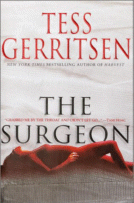
|
I was certainly taken aback by that! Just out of curiosity, I asked her what she did for a living. She said: "I teach the third grade." Well, if third grade teachers were hungry for books about serial killers and twisted sex, then I knew there was a market out there. And even though I had vowed never to write a serial killer book (I thought there were way too many of them on the market) I kept thinking about what that reader had said. I wondered if there was some way to give the genre my own special twist. A medical twist.
And that's how the Surgeon was born. The killer is someone with surgical skills, who uses medical insider knowledge to select his victims. I don't believe any fictional villain has ever chosen his victims in the horrifying way The Surgeon does.
Dr. Catherine Cordell is at the center of the search for the serial killer that the press calls the Surgeon. Catherine is a complex character; she survived a killer's attack, but she is definitely damaged. She is both strong and vulnerable at the same time. What was your inspiration for Catherine?
| "I don't think women are in any way disadvantaged unless they write technical or military fiction. Then they do face the skepticism from male readers, who somehow don't 'trust' a woman to write technically accurate novels." |
One of the detectives on the case is Jane Rizzoli. Rizzoli is an interesting character; she's really not that likeable at first, but she does grow on you after you learn more of her back story. How did you create the character of Jane?
Jane Rizzoli is actually the character I most identified with! She's the outsider in many respects: the only girl in a family of brothers. The only female cop on the homicide squad. The plain jane who's overlooked because other women are more attractive. While I don't have the chip on the shoulder that she has, I do sympathize with her "outsider" status. I think a lot of us do. It's something I discovered as I traveled on book tour, talking to readers -- that even the gorgeous, popular woman somehow feels like an outsider in some respect. And that's why many of my readers identified with Rizzoli.
Jane has suffered a lot of prejudice because she's a woman in a male-dominated field. Have you ever suffered prejudice in your medical career, or in your writing career?
I was lucky to enter medicine at a time when women were finally being accepted as full partners in the profession. My medical school accepted over 40% women in my class. As an internist, I never experienced any sexism, but that's because it's a specialty that's not considered overly macho. I know that women who enter the surgical fields face a far different set of obstacles.
As far my writing career, I don't think women are in any way disadvantaged unless they write technical or military fiction. Then they do face the skepticism from male readers, who somehow don't "trust" a woman to write technically accurate novels.
The story alternates points of view, allowing the reader to glimpse thoughts of the killer, without revealing his identity. How do you put yourself in the mind of a serial killer, in order to write his thoughts?
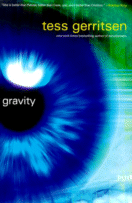
|
Your books have been praised for a number of elements, including their complex and intriguing plots. What is your approach to plotting -- do you outline the plot first?
I don't outline. It somehow spoils the surprise for me. Most often, I will put together a bare synopsis -- five to ten pages long at the most -- just to show the editor what direction I'm going in. Then I sit down and let the story take me where it will. It's not the most efficient way of writing. I often get myself into blind corners and have to rewrite entire sections of the book. I often change directions. But I enjoy being surprised by how a story evolves, and I think it preserves the surprise for my readers as well.
The book also has a romantic element in it. How do you go about integrating the relationship element of the story with the grisly elements? Is it difficult?
Romance has always been the hardest thing for me to
| "Medical training was a window into the most personal aspects of peoples' lives. I've seen the most heartbreaking tragedies, and watched families at their very best -- and worst. I think it's the insight into human nature that makes medicine such intense preparation for any writing." |
You write about some very disturbing subjects indeed. Do the images you invoke with your writing ever bother you? Or are you able to put them out of your mind, after a day's writing is over?
In the process of writing such disturbing images, I am actually more focused on the technical aspects of the writing. Is this sentence just right? Should I cut out that modifier, or add an adverb? Does it have the right rhythm? Those distractions put distance between me and the actual scene I'm describing, in the same way a director shooting a movie doesn't see the blood and gore on the movie set, but is more concerned with whether the lighting is correct. I find that when I go back weeks later and read the scene for content -- not for editing purposes -- that I'm often horrified by the images I've conjured up. But during the actual writing of them, I've been too focused on getting the words just right.
I'd like to talk about the day to day details of writing. Would you take us through a typical writing day for you?
I have a home office devoted just to my work, with bookshelves lined with medical and forensic textbooks and a huge desk on which I can spread all my references and various bits of paper. I work with pen and paper for the first draft -- I simply cannot compose fiction on a computer.
I try to get started writing by 9:30, and work until I get four pages done. I don't always manage the quota, unfortunately, and many days are filled with pure frustration. Writing is not easy for me. The more successful I become, in fact, the harder it seems to get, because I feel every critic and reader in the world is looking over my shoulder and shaking their heads about how bad that last sentence turned out. But deadlines help propel me forward, and there are days when I'll read what I wrote the day before and will feel quite satisfied. Those are the days when it's GOOD to be a writer!
Your books are always filled with interesting details. In The Surgeon, the killer seems to have an obsession with sacrificial rituals, for instance, and his descriptions of those are chilling. What was the research like for this book?
The research was utterly fascinating. I studied a lot of
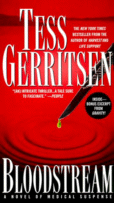
|
While inhabiting a bizarre character, one must become a little bizarre as well.
You were on a book tour during the terrorist attacks on the World Trade Center and the Pentagon. How did that affect your tour? What are your thoughts about the tragedy?
I was about halfway through my tour and in Seattle when the attacks came. At once, both I and the publisher knew the tour had to be cut short. At such a terrible time, we all want to be home with our families, and that's where I wanted to be -- at home. Unfortunately, it wasn't possible, and I remained stranded in Seattle for six days until another flight could be arranged.
I've come to appreciate what really is important in my life. The writing, while fulfilling, means nothing if my family isn't there to go home to. And these events have reawakened my appreciation for what it means to be an American. I think all of us have realized this week that we are patriots.
Clearly you have an excellent work ethic, and know how to put in the necessary effort to achieve your goals in life. Is there anyone in particular that you credit with giving you the encouragement and support to be a success?
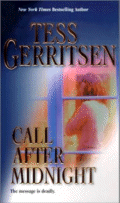
|
How would you say you have evolved as a writer over time?
I think I've learned to be less afraid to tackle the unfamiliar. In particular, Gravity taught me that I can conquer a project that scares the hell out of me. I wrote that book with only a layperson's knowledge of the space program, and somehow it turned out right. I've also learned to take my time with the words, to play with the language, to strive towards the poetic. I know that we popular fiction writers aren't always credited with more than our ability to spin a good yarn and to keep up a fast and furious pace. But I don't ever want to stop thinking of myself as a serious artist as well.
When you're not writing, what are your favorite ways to relax and have some fun?
There's nothing I love better than jamming with my musical friends. I play the fiddle, and there are times when I've crammed up to thirty musicians in my house for a good old Celtic jam session. We drink beer, sing songs, and play our hearts away. If I wasn't a writer, I think I'd want to spend the rest of my life playing my fiddle in pubs.
Return to the October-November 2001 issue of The IWJ.
More from Writers Write
